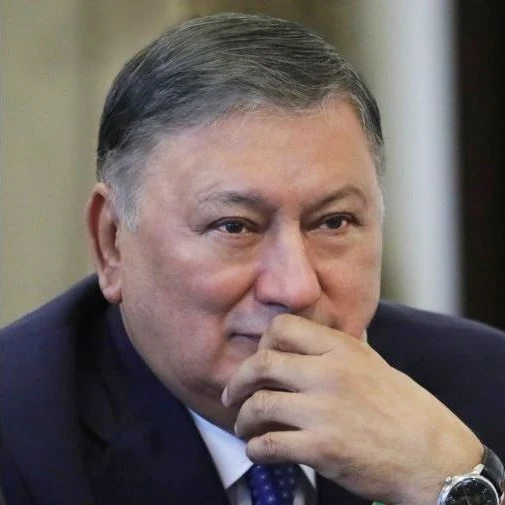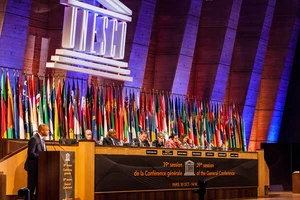Publications
Putin’s Visit to Baku Stirs up Iran-Russia Tensions on Zangezur Corridor  By Vasif HUSEYNOV, PhD, Head of Department, AIR Center, Adjunct Lecturer, ADA and Khazar Universities, Baku By Vasif HUSEYNOV, PhD, Head of Department, AIR Center, Adjunct Lecturer, ADA and Khazar Universities, Baku
On August 18–19, Russian President Vladimir Putin paid a two-day visit to Azerbaijan. This marked the first state visit by a Russian president to the South Caucasian republic and only the second visit in the bilateral relationship since former Azerbaijani President Heydar Aliyev’s trip to Moscow in 2002. Contrary to expectations from local observers, the visit did not yield any significant agreements or binding political and economic arrangements. A few announcements were made regarding future joint initiatives, including cooperation on food security, labour inspections, the establishment of a Russian-Azerbaijani university, and the joint production of oil tankers. An agreement was also reached to expand the partnership between Russia’s public joint-stock company (PJSC) Gazprom and the State Oil Company of the Republic of Azerbaijan (SOCAR) . Gazprom CEO Alexey Miller revealed that the two sides agreed to broaden their “multifaceted strategic partnership,” particularly concerning the International North-South Transportation Corridor (INSTC) project. He also mentioned the planned signing of a comprehensive scientific and technical cooperation program in September. While few details were disclosed, this marked their first public reference to the INSTC project, about which little is currently known. Putin’s visit to Azerbaijan demonstrates how Russia seeks to maintain its influence in the region, which could lead to neighbouring states, such as Iran and Armenia, feeling threatened.
READ MORE
Publications
New powers of the parliament of the New Uzbekistan  Akilov Alimjon Rakhimovich, Akilov Alimjon Rakhimovich,
Chief Researcher of Department of analyzing the effectiveness of constitutional construction and public administration of Institute of Legislation and Legal Policy under the President of the Republic of Uzbekistan, doctor of legal sciences, professor
The year 2016 for Uzbekistan was marked by the beginning of a fundamentally new in essence and content stage of state and social construction, in which the main strategic goal was proclaimed - the construction of a New Uzbekistan, based on the values that served the greatest flourishing of our statehood in the 9th-10th centuries (known in world history as First Eastern Renaissance) and XIV-XV centuries (Second Eastern Renaissance). As in previous periods, the basis and priorities of the Third Renaissance of our statehood are the development of science and modern technologies, which are intended to become drivers of dramatic development of the country’s economy, a radical improvement in the well-being of the people and the prosperity of the nation. READ MORE
Publications
Uzbekistan’s renewed electoral system a key factor in the advancement of representative democracy  Shuhrat Bafayev, Shuhrat Bafayev,
Chairman of the Committee for Democratic Institutions, Nongovernmental Organizations and Citizens’ Self-Government Bodies, Legislative Chamber of the Oliy Majlis of the Republic of Uzbekistan
Over the years of independent development Uzbekistan firmly guided by the principles of universal, equal and direct suffrage in secret voting, has progressively implemented international electoral standards into its electoral legislation. In 2017, in his first Address to the Parliament, the President of Uzbekistan Shavkat Mirziyoyev suggested that the current national electoral legislation does not ensure its harmonization and proposed to develop an Electoral Code that meets international norms and standards. Thus, the Electoral Code was adopted in 2019, incorporating more than 30 new democratic norms for organizing and conducting election processes. The approval of the Code marked the dawn of a new stage in the development of representative democracy in the country. READ MORE
Publications
The awakening lion: the era of renewal  Hey, great Turan, land of lions! Hey, great Turan, land of lions!
What has become of you? What are these days you endure now?
Oh, glorious cradle of Genghis, Timur, Oghuz, and Attila!
Where have the esteemed seats you once held gone?..
Abdurauf Fitrat
An American politician once said of the current life and fate of the Central Asian region: ‘They are neither post-Soviet nor post-communist countries now’.
Today no specialist knowledge is needed to understand this idea, which suggests that such labels are outdated in the research community. For example, ten to fifteen years ago the political behaviour of Central Asian societies – neighbours for thousands of years – was prone to national separatism, mutual dislike and latent hostility, but today they have undergone a remarkable transformation. Ideologues and ordinary Central Asians only a couple years ago endeavoured to prove their superiority, their antiquity and, for these very reasons, their greater belonging to the historical and cultural heritage of the region. Though they still might hurl some sharp insults at each other, now they have become united neighbours.
READ MORE
Publications
UNESCO General Conference to be held in Samarkand, Uzbekistan  The 43rd UNESCO General Conference is scheduled to take place in Samarkand in 2025. The 43rd UNESCO General Conference is scheduled to take place in Samarkand in 2025.
This marks the first time Uzbekistan will host the biennial event. Historically, these conferences have primarily been hosted at UNESCO's headquarters in Paris since 1986. However, there have been eight exceptions, with meetings held in cities like Mexico City (1947), Beirut (1948), Florence (1950), Montevideo (1954), New Delhi (1956), Nairobi (1976), Belgrade (1980), and Sofia (1985).
READ MORE
Publications
Military Supplies to Armenia Escalate Tensions in South Caucasus  By Vasif HUSEYNOV, PhD, Head of Department, AIR Center, Adjunct Lecturer, ADA and Khazar Universities, Baku By Vasif HUSEYNOV, PhD, Head of Department, AIR Center, Adjunct Lecturer, ADA and Khazar Universities, Baku
On July 31, US Assistant Secretary of State for European and Eurasian Affairs James O’Brien reaffirmed Washington’s plans to establish a land trade route through Azerbaijan and Armenia. He stated that this route aims to offer Central Asian countries an alternative and reduce their reliance on Russia and China for access to global markets. In addition to his earlier remarks, O’Brien pointed out that part of this strategy is aimed to “create conditions” for Armenia to “distance itself from Russia”. According to him, Armenia is “almost completely dependent” on Russia for its economy and energy. Therefore, the United States supports Prime Minister Nikol Pashinyan’s bold steps in his diversification efforts. Armenia’s re-posturing is representative of a geopolitical shift occurring throughout the wider region as the three states of the South Caucasus move further away from Russian influence.
READ MORE
Publications
CERR: IMF Estimates Uzbekistan's GDP at $101.6 Billion  According to the IMF's assessment, the nominal GDP of the Republic of Uzbekistan in 2023 increased by 125.6 trillion sums ($10.7 billion) and amounted to 1,192.2 trillion sums ($101.6 billion). According to the IMF's assessment, the nominal GDP of the Republic of Uzbekistan in 2023 increased by 125.6 trillion sums ($10.7 billion) and amounted to 1,192.2 trillion sums ($101.6 billion).
CERR hosted a discussion among experts and academics regarding a study conducted by the Statistics Agency in collaboration with the IMF. The primary goal of this study was to assess the size of the unobserved economy in Uzbekistan and examine its impact on other macroeconomic indicators. READ MORE
Publications
What Is Next in Armenia–Turkiye Relations?  By Benyamin POGHOSYAN, PhD, Chairman, Center for Political and Economic Strategic Studies By Benyamin POGHOSYAN, PhD, Chairman, Center for Political and Economic Strategic Studies
The relationship between Armenia and Turkiye has a significant influence on the geopolitical landscape of the South Caucasus. The Turkish blockade of Armenia and refusal to establish diplomatic relations, coupled with the Nagorno-Karabakh conflict, have restricted Armenia’s ability to pursue a more flexible foreign policy, effectively binding it to an alliance with Russia. Normalizing relations with Azerbaijan and Turkiye would allow Yerevan to explore foreign and defence policy alternatives beyond its reliance on Russia. The United States has persistently advocated for Armenia–Turkiye normalization, viewing this as an essential step in untangling the post-1994 status quo in the South Caucasus, which is marked by Russian dominance through its military and economic presence in Armenia. Washington has actively engaged in many efforts, including track 1, track 1.5, and track 2 diplomacy, with initiatives such as the Turkish-Armenian Reconciliation Commission and the 2008–2009 “football diplomacy” serving as notable examples.
READ MORE
|
|